Brain Fog and Procrastination: Supplements for Mental Clarity
Introduction
Everyone knows the feeling: you sit down to focus, but your mind feels like a foggy window. The harder you try to think clearly, the more sluggish your brain becomes. You forget what you were about to do, struggle to find words, and suddenly, every task feels impossible. So you do what feels easiest—you put it off.
This combination of brain fog and procrastination isn’t a coincidence. When your brain’s chemistry is out of balance or your cells are running low on energy, your ability to focus, plan, and act takes a hit. And while willpower can push you through temporarily, it’s not a long-term fix.
In this 3,000-word deep dive, we’ll explore:
The neuroscience behind brain fog and procrastination
How lifestyle factors like stress, sleep, and diet affect focus
Supplements that support mental clarity, energy, and motivation
How to build habits that clear your mind naturally
Looking for supplements for This? Click here.
What Is Brain Fog? ☁️
Brain fog isn’t a medical diagnosis—it’s a symptom of cognitive dysfunction. People describe it as feeling mentally cloudy, forgetful, or detached.
You might notice:
Slower thinking or confusion
Poor memory recall
Difficulty concentrating
Feeling mentally tired even after rest
It’s like your brain’s bandwidth is throttled—you’re operating on low signal strength.
This mental sluggishness feeds directly into procrastination. When it’s hard to focus or make decisions, starting tasks feels overwhelming.
The Connection Between Brain Fog and Procrastination 🧩
At its core, procrastination isn’t about laziness—it’s about mental resistance. You procrastinate when your brain perceives a task as too mentally demanding for your current energy level.
Brain fog amplifies this resistance. The prefrontal cortex—the part of your brain responsible for executive function, planning, and decision-making—requires optimal oxygenation, glucose, and neurotransmitter balance to perform well.
When it’s underpowered due to inflammation, stress, or fatigue, you experience:
Decision fatigue: Too much effort to choose what to do next
Cognitive fatigue: Mental exhaustion from small tasks
Reward system dysregulation: Reduced dopamine sensitivity, meaning motivation drops
So brain fog doesn’t just slow thinking—it weakens the neural drive to take action, trapping you in a loop of avoidance and frustration.
What Causes Brain Fog? 🧠💤
There isn’t a single cause—it’s usually the result of several overlapping factors.
Chronic Stress and Cortisol Overload
Cortisol, the body’s main stress hormone, is helpful in short bursts but harmful in excess. Prolonged stress reduces dopamine and serotonin levels, increases inflammation, and shrinks brain regions related to focus and memory (like the hippocampus).
Poor Sleep and Circadian Rhythm Disruption
Sleep is when your brain clears metabolic waste through the glymphatic system. Lack of sleep leads to toxin accumulation, reduced neuroplasticity, and impaired focus.
Nutrient Deficiencies
The brain needs nutrients like B vitamins, magnesium, omega-3s, and antioxidants to generate energy and protect against oxidative damage. Deficiency in these nutrients leads to mitochondrial fatigue and neurotransmitter imbalance.
Blood Sugar Imbalances
Irregular meals or diets high in refined carbs cause blood sugar spikes and crashes. The brain—dependent on steady glucose—responds with fatigue, irritability, and fogginess.
Inflammation and Oxidative Stress
Systemic inflammation from poor diet, infections, or chronic stress increases cytokines that interfere with neuronal signaling. The result: cognitive slowdown and low motivation.
The Neurochemistry of Focus and Motivation ⚡
When your mind is clear, it’s because neurotransmitters like dopamine, acetylcholine, and norepinephrine are working in harmony.
Dopamine fuels anticipation, motivation, and reward.
Acetylcholine supports learning, memory, and concentration.
Norepinephrine sharpens alertness and response speed.
When these are depleted, you feel sluggish, unmotivated, and unfocused—classic brain fog and procrastination symptoms.
The Energy Problem: Mitochondria and Mental Clarity 🔋
Every thought, memory, and decision depends on mitochondria, the energy factories inside your cells. When mitochondrial function declines, so does your mental performance.
Factors that damage mitochondria include:
Chronic stress and cortisol overload
Poor sleep and oxygenation
High sugar diets
Nutrient deficiencies (especially CoQ10, B vitamins, and magnesium)
Supporting mitochondrial energy production can dramatically improve mental clarity and endurance.
Supplements That May Help Clear Brain Fog and Boost Motivation 🌿💊
Let’s explore science-backed nutrients and compounds that support cognitive energy and clarity.
Acetyl-L-Carnitine (ALCAR)
What it does:
ALCAR shuttles fatty acids into mitochondria to produce ATP and enhances acetylcholine synthesis for learning and focus.
Benefits:
Increases brain energy metabolism
Enhances focus and mental clarity
Reduces fatigue and improves motivation
Dosage: 500–1,000 mg daily in the morning.
Best paired with: Alpha-GPC or CDP-Choline for enhanced acetylcholine support.
CoQ10 (Coenzyme Q10)
What it does:
CoQ10 helps mitochondria generate ATP efficiently, protecting neurons from oxidative stress.
Benefits:
Supports sustained mental and physical energy
Reduces “afternoon slump” fatigue
Enhances alertness and endurance
Dosage: 100–200 mg with food (preferably with fats).
Looking for supplements for This? Click here.
Rhodiola Rosea
What it does:
Rhodiola is an adaptogen that balances stress hormones and boosts dopamine sensitivity.
Benefits:
Reduces mental fatigue from chronic stress
Improves motivation and task initiation
Enhances endurance and emotional stability
Dosage: 200–400 mg standardized extract daily.
Omega-3 Fatty Acids (EPA & DHA)
What they do:
Omega-3s build neuronal membranes and regulate neurotransmission. Low levels are linked to depression, poor focus, and cognitive decline.
Benefits:
Enhances dopamine function and receptor sensitivity
Supports memory and mood balance
Improves overall cognitive efficiency
Dosage: 1,000–2,000 mg combined EPA/DHA daily.
L-Tyrosine
What it does:
An amino acid precursor for dopamine and norepinephrine. During stress, your brain burns through tyrosine rapidly.
Benefits:
Boosts motivation and alertness
Reduces “mental fatigue” under pressure
Improves reaction time and mood stability
Dosage: 500–1,500 mg before mentally demanding tasks.
B-Complex Vitamins
What they do:
B vitamins are co-factors for energy metabolism and neurotransmitter synthesis.
Benefits:
Reduces stress and anxiety
Enhances mental energy and focus
Supports dopamine and serotonin production
Dosage: A balanced B-complex with at least 10–25 mg of each major B vitamin daily.
Magnesium (Glycinate or Threonate)
What it does:
Magnesium regulates neurotransmitter activity and ATP synthesis while calming an overactive nervous system.
Benefits:
Promotes relaxation and mental clarity
Supports energy production
Improves sleep and recovery
Dosage: 200–400 mg daily, preferably at night.
Ginkgo Biloba
What it does:
Improves blood flow to the brain and enhances oxygen delivery to neurons.
Benefits:
Improves memory and cognitive speed
Reduces brain fog and mental fatigue
Enhances focus under stress
Dosage: 120–240 mg of standardized extract daily.
Alpha-GPC or CDP-Choline
What they do:
Both are bioavailable forms of choline that boost acetylcholine, a key neurotransmitter for learning and mental agility.
Benefits:
Enhances memory and focus
Supports brain energy metabolism
Synergistic with ALCAR and B vitamins
Dosage: 300–600 mg daily.
Lion’s Mane Mushroom
What it does:
Stimulates nerve growth factor (NGF), promoting neuroplasticity and brain regeneration.
Benefits:
Improves cognitive clarity
Supports long-term brain health
Reduces anxiety and boosts focus
Dosage: 500–1,000 mg daily of standardized extract.
Looking for supplements for This? Click here.
Lifestyle Habits That Amplify Supplement Benefits 🧘
Supplements are most effective when supported by lifestyle habits that nurture brain energy.
Prioritize Sleep Quality
Aim for 7–9 hours of deep, restorative sleep. Use magnesium or L-theanine if anxiety or overstimulation prevents rest.
Move Your Body Daily
Exercise increases oxygen flow and stimulates dopamine release. Even a 15-minute walk improves clarity and mood.
Eat Smart for Brain Health
Include omega-3-rich foods (salmon, chia seeds), antioxidant vegetables (spinach, berries), and slow carbs for stable energy.
Limit Dopamine Drains
Overuse of social media and constant multitasking desensitize dopamine receptors. Try digital detox periods and monotasking.
Manage Stress Intentionally
Use meditation, deep breathing, or journaling to activate the parasympathetic nervous system and lower cortisol.
Want to try Breathwork? Click Here.
Stay Hydrated
Dehydration reduces brain volume temporarily and impairs focus. Drink water throughout the day.
The Role of Inflammation and Gut Health 🌿
Emerging research links gut inflammation to brain fog via the gut-brain axis. An unhealthy gut microbiome can produce inflammatory cytokines that cross the blood-brain barrier, impairing neurotransmission.
Supporting gut health improves clarity and energy:
Take probiotics (Lactobacillus and Bifidobacterium strains)
Eat prebiotic foods (bananas, onions, garlic)
Avoid excessive sugar and processed foods
A healthy gut supports serotonin and dopamine production—key neurotransmitters for focus and motivation.
A Holistic Approach to Mental Clarity 🌞
Brain fog and procrastination often coexist because they share the same biological roots: low energy, poor neurotransmitter balance, and chronic stress.
Combining supplements that boost mitochondrial function (CoQ10, ALCAR), balance stress hormones (Rhodiola, magnesium), and enhance neurotransmitters (L-tyrosine, choline, omega-3s) can restore focus and motivation from the inside out.
The goal isn’t to “hack productivity” but to rebuild the biochemical foundation that makes focus effortless and sustainable.
Sample Morning Routine for Mental Clarity ☀️
7:00 AM – Wake up, hydrate with a glass of water and lemon.
7:15 AM – Light exercise or stretching to increase blood flow.
7:45 AM – Breakfast with protein, healthy fats, and slow carbs.
8:00 AM – Take ALCAR, Rhodiola, and Omega-3s.
8:30 AM – Focus session (Pomodoro technique: 25 min work, 5 min rest).
10:00 AM – Short walk and mindful breathing.
12:00 PM – Balanced lunch (greens, lean protein, quinoa).
2:00 PM – Take B-complex and magnesium if energy dips.
10:00 PM – Magnesium glycinate before bed for deeper sleep.
This daily rhythm aligns your energy system with your brain’s natural dopamine cycle, enhancing both clarity and motivation.
Final Thoughts: Clearing the Mental Fog 🌿✨
Procrastination and brain fog are not personality flaws—they’re signs your brain is struggling to operate efficiently. When neurotransmitters are imbalanced or your cells are energy-deprived, focus and motivation become biologically harder to access.
The solution lies in restoring brain energy, neurochemical balance, and nervous system calm.
Through smart nutrition, targeted supplements like ALCAR, CoQ10, Rhodiola, and B vitamins, and restorative habits like sleep and mindfulness, you can lift the fog, silence the mental noise, and rediscover the clear, focused version of yourself.
Because once your mind feels light again, taking action becomes natural. 💛🧠
Looking for online therapy ? Click Here.
References 📚
Kennedy, D. O. (2016). Cognitive function, brain energy, and nutritional influences. Nutrition Reviews.
Benton, D., Donohoe, R. (1999). The influence of nutrients on mental performance. Brain Research Bulletin.
Panossian, A., & Wikman, G. (2010). Adaptogens in stress and fatigue: regulation of homeostasis through mechanisms of action. Phytomedicine.
Wurtman, R. J., & Cansev, M. (2011). Nutritional support for neurotransmitter synthesis and mental performance. Nature Reviews Neuroscience.
Arnsten, A. F. T. (2009). Stress signaling pathways that impair prefrontal cortex structure and function. Nature Reviews Neuroscience.
Smith, J. V., & Luo, Y. (2004). Mitochondrial support nutrients for cognitive vitality. Neurosignals.
Peirson, S. N., & Foster, R. G. (2014). Sleep and dopamine regulation in cognition and emotion. Trends in Neurosciences.
Stough, C., et al. (2001). Ginkgo biloba extract improves memory and cognitive performance in healthy individuals. Psychopharmacology.
Liu, R., et al. (2019). The gut-brain axis and cognitive function: A new perspective for nutrition and mental health. Frontiers in Neuroscience.
Parnetti, L., et al. (2001). CoQ10 and brain energy metabolism: clinical implications. Neurobiology of Aging.
Related Posts
-

Why Co-Dependency Feels Draining: Adrenal Fatigue and Supplements That Help
The adrenal glands are small but powerful organs that sit above your kidneys, acting as your body’s built-in stress managers. They produce hormones like cortisol and adrenaline that help regulate energy, mood, and resilience. When they’re overworked from chronic stress or emotional exhaustion, fatigue and imbalance follow. Supporting adrenal health naturally can help restore calm, energy, and hormonal balance. 🌿⚡
-

The Link Between Anxiety, Co-Dependency, and Natural Support
Anxiety feels like living in constant alert mode—your heart races, your thoughts loop, and your body can’t find peace. It’s the nervous system’s way of preparing for danger, even when none exists. Understanding what’s happening in your mind and body is the first step toward calming the storm and restoring balance. 🌿💫
-

Supplements That Support Dopamine and Serotonin in Co-Dependent Patterns
Serotonin is the neurotransmitter of calm, confidence, and contentment. When it’s balanced, you feel peaceful and emotionally grounded. When it’s low, anxiety, mood swings, and emotional dependence take over. By understanding serotonin’s role in emotional health—and how to support it naturally—you can rebuild inner stability, improve relationships, and cultivate lasting happiness from within. 🌞💫
-

How Emotional Exhaustion in Codependency Impacts the Nervous System
The nervous system is the body’s communication network, connecting the brain to every organ and muscle. It regulates stress, mood, and emotion through a delicate balance of electrical and chemical signals. When overwhelmed, it can become dysregulated—leading to fatigue, anxiety, and emotional imbalance. Understanding how to calm and strengthen the nervous system is key to healing from chronic stress and emotional burnout. ⚡🌿
-

What Is Co-Dependency? The Role of Brain Chemistry and Stress
Stress is more than a feeling—it’s a full-body experience that begins in the brain and ripples through every cell. When cortisol surges and the nervous system stays on alert, your body can’t rest or recover. Over time, this constant tension affects energy, focus, mood, and even immune health. Understanding stress chemistry is the first step toward breaking free from burnout and finding calm again. 🌿
-

Creating a Supplement Stack for Motivation, Energy, and Anti-Procrastination
Motivation is the fuel behind every meaningful achievement—but it’s not just about willpower. It’s a mix of mindset, brain chemistry, and momentum. When energy, focus, and purpose align, action feels natural instead of forced. Learn how to harness motivation as a daily state, not a fleeting feeling.
-

Supplements for Building Consistency and Reducing Chronic Procrastination
Biochemistry is the bridge between biology and chemistry—the science of life at the molecular level. It explains how nutrients, hormones, and neurotransmitters interact to create energy, thought, and emotion. From brain function to muscle movement, biochemistry reveals the invisible processes that sustain health, balance, and vitality.
-

GABA and Procrastination: Supporting Calm Focus for Productivity
GABA is the brain’s natural calming messenger—a neurotransmitter that helps slow mental overactivity and ease stress. When GABA levels drop, focus fades, anxiety rises, and procrastination becomes more likely. By supporting GABA through nutrition, lifestyle, and supplements, you can restore calm clarity, improve focus, and take action with steady, balanced energy.
-

Ashwagandha and Procrastination: Lowering Stress to Improve Action
Science is the language of curiosity and discovery. It helps us understand the hidden patterns behind life, energy, and the universe. Through experimentation and critical thinking, science connects imagination to evidence—turning questions into knowledge. Whether through microscopes, molecules, or minds at work, science represents our endless pursuit of truth and innovation.
-

Neurotransmitters and Motivation: Supplements That Support Drive and Focus
Supplements can do more than boost physical health—they can also enhance mental clarity, focus, and motivation. Nutrients like omega-3s, magnesium, B vitamins, and adaptogens help balance neurotransmitters, stabilize mood, and support brain energy. When combined with good sleep, nutrition, and mindful habits, they can transform how your brain performs under stress.
-

How Stress Hormones Like Cortisol Fuel Procrastination (and What Helps)
Blood sugar isn’t just about physical health—it directly impacts focus, mood, and motivation. When glucose levels spike and crash, energy and attention do the same, fueling procrastination and brain fog. Learning how to stabilize blood sugar through balanced meals, mindful habits, and key nutrients helps keep your mind steady, focused, and ready to act.
-

The Link Between Low Energy and Procrastination: Can Supplements Help?
Neurochemistry shapes how we think, feel, and act. When neurotransmitters like dopamine, serotonin, and GABA fall out of balance, it can lead to fatigue, anxiety, or lack of motivation—fueling procrastination and low mood. Understanding the brain’s chemical communication system helps us find ways to restore focus, calm, and emotional stability through nutrition, mindfulness, and targeted supplements.
-

Why Do We Procrastinate? The Role of Dopamine and Supplements That Support It
Dopamine is the brain’s motivation messenger—the chemical that fuels focus, reward, and drive. When dopamine levels drop, even simple tasks can feel impossible to start. This article explores how dopamine shapes procrastination, motivation, and mental energy, along with natural supplements and daily habits that help restore balance and get things done.
-

Phosphatidylserine and Stress Reduction for People with BDD
Stress is more than a mental state—it’s a full-body experience that affects hormones, brain chemistry, and emotional balance. For people with Body Dysmorphic Disorder (BDD), constant tension and worry about appearance can overload the nervous system. Learning how stress works and finding ways to calm it is key to breaking the cycle of anxiety and self-criticism.
-

How Antioxidants Like Vitamin C & E Support Mental Health in BDD
Antioxidants are the body’s natural defense against stress and inflammation. For people with Body Dysmorphic Disorder (BDD), oxidative stress can worsen fatigue, anxiety, and emotional imbalance. Nutrients like Vitamin C and E help protect brain cells, boost neurotransmitter function, and support a calmer, clearer mindset—building a stronger foundation for recovery.
-

Ginkgo Biloba and Memory Support for BDD Recovery
Emotional regulation is the foundation of healing from Body Dysmorphic Disorder (BDD). When the nervous system stays in constant overdrive, even small stressors can trigger self-critical spirals. Learning to calm emotional reactivity helps restore clarity, confidence, and a sense of inner balance. By blending mindfulness, nervous system support, and self-compassion, you can retrain your brain to respond—not react—to emotion.
-

Alpha GPC and Cognitive Function in Body Dysmorphic Disorder
Mental fatigue can feel like your brain has hit a wall—thoughts slow down, focus fades, and motivation disappears. For people with Body Dysmorphic Disorder (BDD), chronic overthinking, emotional stress, and constant self-evaluation can deplete mental energy even further. Understanding what causes this cognitive exhaustion is the first step toward recovery—through rest, balanced nutrition, and targeted brain-supporting supplements.
-

N-Acetyl L-Tyrosine and BDD: Supporting Mental Clarity
Chronic stress doesn’t just affect your mood—it reshapes your brain chemistry, weakens focus, and fuels the obsessive thought loops common in Body Dysmorphic Disorder (BDD). Over time, constant cortisol elevation drains mental energy and emotional balance. Learning to recognize and manage chronic stress is essential to restoring mental clarity, self-compassion, and resilience.
-

Chamomile and Lavender for Calming Obsessive Body Image Thoughts
The nervous system is the command center of our emotional and physical world—and in Body Dysmorphic Disorder (BDD), it often operates in overdrive. Understanding how the brain and body communicate under stress reveals why intrusive thoughts feel uncontrollable. Learning to regulate the nervous system through calm practices, nutrition, and supplements helps restore inner balance and emotional safety.
-

Adaptogens for Body Dysmorphic Disorder: Rhodiola, Ginseng, and More
Rhodiola rosea, often called the “golden root,” is an adaptogenic herb renowned for boosting stress resilience and mental endurance. For individuals with Body Dysmorphic Disorder (BDD), Rhodiola may help reduce fatigue, regulate cortisol, and enhance emotional balance. By supporting both mind and body, this powerful plant promotes calm focus, improved mood, and renewed energy to face daily challenges.
-

B Vitamins for Stress Resilience in BDD: Rebuilding Calm from Within
Biochemistry is at the heart of every thought, emotion, and reaction we experience. In Body Dysmorphic Disorder (BDD), chemical imbalances in neurotransmitters like serotonin, dopamine, and GABA can amplify stress and distort self-perception. Understanding the biochemistry behind mood and stress regulation offers a path toward healing—bridging the gap between emotional experience and the body’s molecular balance.
-

Melatonin and Body Dysmorphic Disorder: Restoring Healthy Sleep Patterns
Melatonin, the body’s natural sleep hormone, plays a vital role in helping people with Body Dysmorphic Disorder (BDD) restore healthy sleep cycles. When anxiety and obsessive thinking interfere with rest, melatonin levels often drop, leading to more emotional reactivity and distorted self-perception. This article explores how melatonin works, why BDD disrupts it, and how natural supplementation—combined with mindful routines—can help the brain and body finally find calm at night.
-

Sleep Struggles with BDD: Supplements for Rest and Recovery
When you’re living with Body Dysmorphic Disorder (BDD), restful sleep can feel impossible—but the right supplements can help reset your body’s natural rhythm. From magnesium and L-theanine to 5-HTP and ashwagandha, these nutrients support relaxation, lower cortisol, and enhance melatonin production. This article explores how supplements can calm the mind, ease nighttime anxiety, and promote true restorative sleep for emotional and physical recovery.
-

5-HTP and Serotonin Balance: Could It Help with Body Dysmorphic Disorder?
Anxiety can feel like a storm inside the mind—restless, overwhelming, and hard to control. In people with Body Dysmorphic Disorder (BDD), anxiety often fuels obsessive thoughts and self-criticism, creating a painful cycle of worry and self-doubt. This article explores the biological roots of anxiety, the role of neurotransmitters like serotonin and GABA, and how natural strategies such as mindfulness, supplements, and nervous system regulation can restore calm and mental clarity.
-

Can Ashwagandha Help Ease Stress and Anxiety in Body Dysmorphic Disorder?
Neurotransmitters like serotonin, dopamine, GABA, and acetylcholine are the chemical messengers that shape how we think, feel, and react to stress. In Body Dysmorphic Disorder (BDD), imbalances in these neurotransmitters can amplify anxiety, obsessive thinking, and emotional distress. This article explores how restoring healthy brain chemistry through nutrition, supplements, and mindfulness can help bring clarity, calm, and emotional stability.
-

L-Theanine for BDD: Finding Calm in the Mind
Neurochemistry plays a central role in how we think, feel, and see ourselves. For those living with Body Dysmorphic Disorder (BDD), imbalances in neurotransmitters like serotonin, dopamine, and GABA can intensify anxiety, obsessive thoughts, and emotional distress. This article explores how regulating brain chemistry through supplements, mindfulness, and lifestyle changes can bring the nervous system back into harmony and restore inner calm.
-

Omega-3 Fatty Acids and Body Image Disorders: Supporting Emotional Health
Omega-3 fatty acids do far more than support heart health—they nourish the brain, stabilize mood, and may ease the emotional turbulence tied to body image disorders like BDD. This in-depth article explores how omega-3s regulate serotonin, dopamine, and inflammation, helping individuals reduce obsessive thoughts and rebuild self-acceptance. It also connects nutrition to therapy, mindfulness, and nervous system balance for holistic emotional healing.
-

Magnesium and BDD: Calming an Overactive Nervous System
Magnesium plays a crucial role in calming an overactive nervous system—something people with Body Dysmorphic Disorder (BDD) struggle with daily. This article explores how magnesium supports relaxation, emotional regulation, and stress reduction while diving into the science behind its connection to brain chemistry. It also examines how combining magnesium supplementation with therapy and breathwork can help rebalance the body’s stress response, reduce obsessive thought patterns, and promote lasting nervous system calm.
-

The Gut-Brain Axis and BDD: Why Probiotics Might Matter
The gut and brain are constantly in conversation — and that dialogue may shape how you experience Body Dysmorphic Disorder. By nurturing your microbiome with probiotics, prebiotics, and gut-healing nutrients, you can help rebalance serotonin, calm anxiety, and restore emotional stability from within 🧠🦠.
-
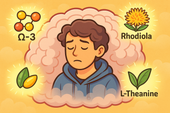
Brain Fog and Body Dysmorphic Disorder: Can Nootropic Supplements Help?
Brain fog often accompanies Body Dysmorphic Disorder, clouding focus and deepening emotional fatigue. Nootropic supplements like L-theanine, Rhodiola, and CoQ10 can help restore mental clarity, balance neurotransmitters, and bring calm energy back to the mind 🌿🧠.
-

How Stress Hormones Like Cortisol May Worsen Body Dysmorphic Disorder
Chronic stress floods the brain with cortisol — the hormone that keeps you on high alert. In Body Dysmorphic Disorder, this chemical overdrive fuels anxiety, distorts self-image, and traps the body in survival mode. Calming cortisol helps restore both peace and perspective 🌿🧠.
-

The Role of Neurotransmitters in BDD—and How Supplements May Help
Neurotransmitters like serotonin, dopamine, glutamate, and GABA shape how people with Body Dysmorphic Disorder perceive themselves. When these brain messengers fall out of balance, perception distorts — but targeted supplements can help restore calm, focus, and emotional regulation 🧠🌿.
-

What Is Body Dysmorphic Disorder? A Deeper Look at the Mind-Body Connection
Body Dysmorphic Disorder (BDD) isn’t just about appearance — it’s about perception. When brain chemistry, trauma, and stress distort self-image, the mind begins to see flaws that aren’t truly there. Healing starts by calming the nervous system and reconnecting mind and body 🪞🧠.
-

Keeping Calm in Competitive Sports: How to Train Your Mind, Body, and Chemistry for Peak Performance
Competitive pressure can overwhelm even the strongest athletes — but calm is trainable. By combining supplements like magnesium, L-theanine, and adaptogens with breathwork and mindset training, you can stay focused, balanced, and in control under any level of stress 🧠🏅.
-

Supplements for Parents Facing Toddler Tantrums: Staying Calm When Little Emotions Run Wild
Toddler tantrums can drain even the most loving parent — but your calm is powerful. With the right supplements like magnesium, L-theanine, and ashwagandha supporting your nervous system, you can stay patient, grounded, and kind, even when emotions run high 🧸🌿.
-

Workplace Stress and Anger Management Support
Workplace stress can quickly turn into frustration — but calm is a skill you can train. By combining supplements like magnesium, L-theanine, and adaptogens with breathwork and mindset tools, you can stay focused, patient, and emotionally grounded no matter how intense the office gets 💼🌿.
-

How to Stay Patient With Family During Stressful Holidays
Holiday gatherings can stir up old stress and test your patience — but calm is possible. With nervous system support from magnesium, L-theanine, and adaptogens, plus mindful breathing and clear boundaries, you can stay centered, kind, and grounded even when family chaos unfolds 🎄💞.
-

Supplements to Keep Calm During Traffic Jams
Getting stuck in traffic doesn’t have to ruin your mood. With calming supplements like magnesium, L-theanine, and ashwagandha, you can train your body to stay relaxed and focused behind the wheel — turning gridlock into a moment of grounded patience 🚗🌿.
-
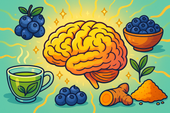
The Role of Antioxidants in Healing Brain Stress from Dissociation
Antioxidants protect the brain from the oxidative stress caused by trauma and dissociation. By neutralizing free radicals and supporting mitochondrial recovery, they help restore clarity, focus, and emotional balance — allowing the mind to heal at the cellular level 🌿🧠.
-
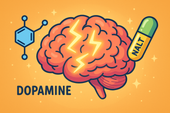
N-Acetyl L-Tyrosine (NALT) for Supporting Mental Clarity
N-Acetyl L-Tyrosine (NALT) fuels dopamine production — the neurotransmitter of focus and motivation. By supporting brain chemistry during stress, NALT helps restore mental clarity, energy, and alertness, making it easier to think clearly and feel present again ⚡🧠.
-

How Ginseng May Improve Focus and Energy in Dissociation
Ginseng helps combat the mental fatigue and fog that often come with dissociation. By supporting mitochondrial energy, balancing neurotransmitters, and regulating cortisol, it gently restores focus, motivation, and emotional presence — helping the mind reconnect with clarity and strength 🌿⚡.
-
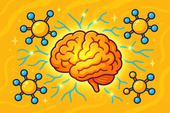
Phosphatidylserine and Dissociation: Supporting Cognitive Function
Phosphatidylserine helps calm the stress response by balancing cortisol, the body’s primary stress hormone. By lowering cortisol spikes, it protects memory, focus, and emotional stability — restoring clarity and mental presence for those struggling with dissociation 🧠🌿.
-
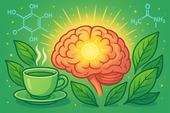
Can Green Tea Extract Help with Dissociative Brain Fog?
Green tea extract may help lift dissociative brain fog by supporting neurotransmitter balance, reducing inflammation, and enhancing energy at the cellular level. With its key compounds EGCG and L-theanine, it promotes calm focus, clarity, and emotional presence — helping you feel more alert and grounded 🍵🧠.
-
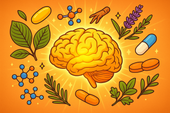
Building a Natural Supplement Stack for Dissociation Support
Building a supplement stack for dissociation means nourishing the brain and body back into communication. By supporting neurotransmitters, gut health, and energy balance through nutrients like magnesium, omega-3s, curcumin, and probiotics, you can help restore clarity, calm, and connection — one layer at a time 🌿🧠.
-

Chamomile and Lavender for Dissociative Anxiety Relief
Chamomile and lavender work together to calm dissociative anxiety by soothing the nervous system and restoring emotional safety. Their natural compounds balance cortisol, enhance GABA activity, and activate the vagus nerve — helping you feel grounded, connected, and at peace again 🌿💜.
-
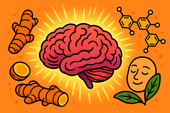
Curcumin for Inflammation and Mental Clarity in Dissociation
Curcumin, the golden compound in turmeric, does more than fight inflammation — it helps clear the mental fog often tied to dissociation. By calming neuroinflammation, balancing neurotransmitters, and supporting mitochondrial energy, curcumin can restore mental clarity, focus, and emotional presence 🌿🧠.
-
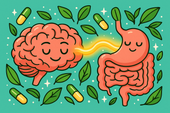
Probiotics and Dissociation: Exploring the Gut–Brain Axis
The gut–brain axis plays a vital role in emotional awareness and presence. When the microbiome is balanced, it supports serotonin production, vagus nerve activity, and calm focus. Probiotics help repair this connection — restoring safety, clarity, and the feeling of truly being in your body again 🌿🧠.
-
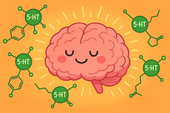
5-HTP for Dissociation: Supporting Serotonin and Emotional Stability
5-HTP helps bridge the gap between emotional numbness and stability by supporting serotonin production — the neurotransmitter that shapes mood, sleep, and sensory awareness. For people experiencing dissociation, 5-HTP may gently restore connection, presence, and emotional balance from the inside out 🌿🧠.
-
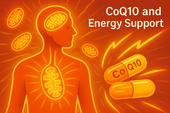
CoQ10 and Energy Support for People with Dissociation
Chronic dissociation often leaves the body running on empty — tired, foggy, and disconnected. CoQ10 helps recharge that system at the cellular level by restoring mitochondrial energy, reducing oxidative stress, and supporting the brain’s capacity to stay present. It’s energy medicine for both body and mind ⚡🧠.

















































